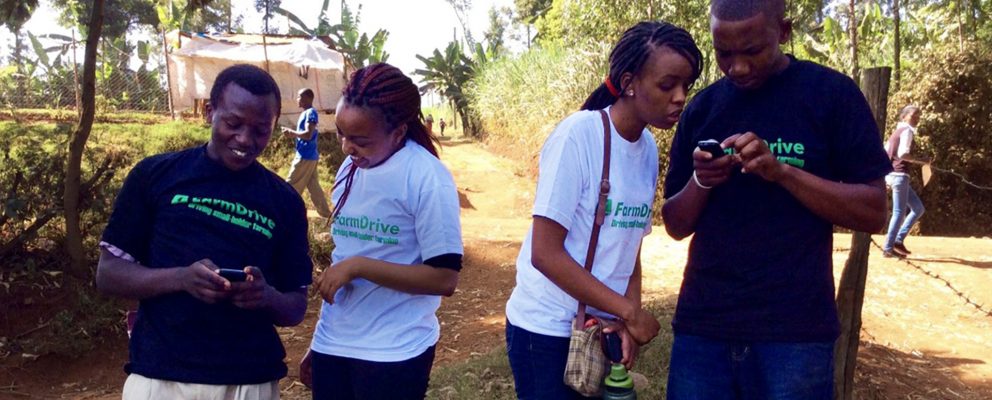
Achieving systemic change through technology, AI, social enterprises
What 1 billion devices mean
Over the past year, Engineers Without Borders Canada (EWB) has evaluated more than 300 early-stage social ventures across sub-Saharan Africa, 30 per cent of which are in the tech sector. They’re leveraging data analytics and artificial intelligence because mobile penetration rates are high, with approximately 1 billion devices being used across the region. That means social ventures using technology can improve quality of life for more people, especially as the population is projected to double by 2050, and young Africans are leaping ahead of older demographics in the use of phones and technology.
Despite the increase in the adoption and reach of technology, and the abundance of ventures building these tools into their business, Africa falls behind other regions in projected economic growth potential from advanced technology and AI. According to a PwC report published earlier this year, developing countries will experience economic gains (approximately less than six per cent of GDP) that are half or less of what is expected for Europe, developed Asia and North America.
Invest, scale, de-risk
A primary factor creating disparities between the growth and potential of AI in developed compared to developing economies is weak market infrastructure to commercialize innovations. Ventures in developed countries have access to robust academia, talent and financial resources helping new businesses enter the market. Mobilizing more funding, talent and creating partnerships can accelerate the growth of ventures in sub-Saharan Africa, and therefore the use of technology and its impact on livelihoods.
EWB’s investment approach focuses on addressing the financing and talent gaps for pre-seed and seed-stage ventures. Our aim is to be the founding investor in social enterprises, help them scale their ideas and business to viability and sustainability and, ultimately, de-risk and catalyze follow on investments from others.
To date, we are invested in nine social enterprises, six of which are using advanced technology to address root causes of poverty and inequality. This July, EWB invested in M-Shule, an educational tech venture using artificial intelligence to create tailored testing for students in underserved Kenyan communities. Given high student to teacher ratios in classrooms and projected growth in young demographics, M-Shule’s algorithm helps students get individualized learning. Student subscribers to their platform respond to quiz questions via text and the difficulty of the questions changes based on their results. Data from student subscribers is collected to support all stakeholders within the education circle of a student. Subscriptions for teachers, school administrators and parents provides access to the data and help them better fulfill their role for the student.
FarmDrive, a venture EWB invested in in 2015, uses data analytics and mobile technology to create financial profiles for farmers through a credit scoring model. Agriculture accounts for around 65 per cent of employment and 32 per cent of gross domestic product but over 90 per cent of sub-Saharan Africa’s 48 million smallholder farmers lack access to formal credit. There is approximately a $450 million financing gap for these farmers. With financial profiles, farmers can better qualify or access credit or loans to purchase resources—vehicles, tools, higher quality inputs—that improve the sustainability or profitability of their operations.
M-Shule and FarmDrive are just two examples of social ventures demonstrating how the scalability of their platforms better serves their beneficiaries. Our investment helped M-Shule launch their pilot and less than two months later, 17 schools and nearly 300 students had subscribed to the platform. In the two years since EWB invested in FarmDrive, the company has signed on nearly 2,000 farmers in Kenya and secured follow on investments from other partners, including SafariCom.
AI = actual impact
EWB set out to be and remains sector agnostic, but the potential of data analytics and artificial intelligence to solve persistent social issues has captured our attention. Global investments in tech and AI and the projected economic growth from AI globally draws our attention even more to the potential of the budding sector in sub-Saharan Africa. Tech has permeated businesses across sub-Saharan Africa, which suggests the region may be closer to realizing the full potential of artificial intelligence.
EWB also takes pause at this acceleration. Our investment approach aims to ensure that advanced technology or AI is a solution with ecosystem impacts on issues facing the region. For EWB, a venture’s social mission comes first before investigating how the model incorporates technology to achieve results. A strong understanding of the problem leads to a more effective product or service, and the success of the business is defined by how people’s lives have changed for the better because of it. That’s a big part of why we believe in investing in local ideas for local solutions.
While AI has valuable pervasive qualities, it does not have inherently equal benefits nor is it designed equal. Implementing AI tools in regions that were not considered part of their target market can be quite damaging in the long-term. The high scalability of technologies makes this risk exponentially higher. For example, financial education tools, which do not take into account local realities, carry these high risks. They can lead to unhealthy financial behaviour or, worse, to distrust in financial literacy products or initiatives, and in the formal financial system as a whole.
Collaboration, critical thinking and asking tough questions will be key in ensuring that advanced technology and AI in sub-Saharan Africa continue to be viable solutions to causes of poverty. While the world races to reap technology’s projected regional and global economic benefits, let’s also keep in mind what people need today to inform where we’re headed. EWB, other investors and experts can help social enterprises in sub-Saharan Africa, which are prioritizing the current needs of people and existing systems, to shape better economic and social outcomes for future generations.
Visit our ventures page for more information on the businesses EWB is invested in.
James Haga, Vice President, Strategy and Investment
James oversees the organization’s investment, talent and advocacy models towards achieving poverty alleviation. He manages the investments, directing capital, fellowships and advisory services to early stage for-profit social enterprises. James has 10 years of experience working in Africa markets and is recognized as a thought-leader and an expert in social impact investing. Most recently, James has been asked to speak before The Standing Committee on Foreign Affairs and International Development and The Standing Committee on Finance to provide expert testimony on a range of Canadian and Federal budget challenges to establish Canada’s Development Finance Institution.
Muthoni Wachira, Director, Investment
Muthoni leads the overall strategy for EWB’s investment portfolio ensuring our investment decisions are contributing to our goals for social impact. She manages EWB’s team of Investment Offers in sub-Saharan Africa, guiding evaluations of investment potential in social enterprises across the region. Muthoni has 10 years experience in finance and investment in Europe and Africa, is a 2017 Acumen Fellow and was the Senior Investment Manager at Schooner Africa Fund. In the past decade, Muthoni co-founded two fintech startups in Kenya that together have given more than 10,000 underserved individuals and small- and micro- enterprises their first loans. She holds a BSc. in Actuarial Science from Cass Business School in London.
